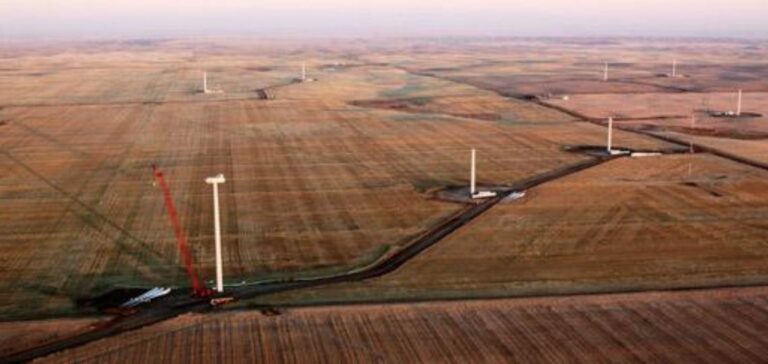Alberta’s seven-month pause in approving new renewable energy projects in the Canadian province has prompted four major international companies at various stages of development to halt their plans, an industry official said.
Suspension of renewable energy projects in Alberta creates political friction and investment uncertainty
Wind and solar energy producers have criticized Premier Danielle Smith for creating commercial uncertainty and jeopardizing billions in potential investment. On August 3, Alberta, the country’s main oil and gas producing province, suspended the approval of new renewable electricity generation projects larger than one megawatt until February 29, thus cooling investment in this fast-growing sector.
This pause is necessary to address concerns about renewable energy reliability and land use, said a spokesperson for Alberta’s Minister of Public Utilities. This decision has heightened tensions between Mme. Smith and Prime Minister Justin Trudeau’s Liberal government, which is drafting regulations to require provinces to eliminate greenhouse gas emissions from their networks on a net basis by 2035.
One of the international companies that halted work had applied to build a renewable energy project in the province, said Jorden Dye, acting director of the Business Renewables Centre, a Calgary-based organization that connects renewable energy developers and buyers. A second company has halted design work on its first project in Alberta, Dye added. A third company delayed its plans to lease office space in Calgary, while a fourth made preliminary enquiries about investment opportunities in Alberta before deciding to wait, he added.
“These investment decisions (…) will not be taken until the government has clarified the situation,” said Mr. Dye.
He specified that he could not name the companies as the projects are confidential.
Alberta’s renewable energy path threatened by approval pause
Alberta has led the country in building renewable capacity and is on track to eliminate coal-fired power generation next year, six years ahead of schedule. In addition to domestic companies, foreign companies such as BHE Canada (Berkshire Hathaway), EDF Renewables and Enel Green Power produce renewable energy in Alberta. Companies have invested nearly C$5 billion (€3.7 billion) since 2019, according to the Pembina Institute.
The pause directly affects 15 projects awaiting approval, said the government spokesman. But Pembina said the freeze jeopardized a total of 91 projects in early stages of development. Calgary-based BluEarth Renewables is reviewing the 400 megawatts of early-stage wind and solar projects it was considering for the province, although it currently has no projects in Alberta’s approval queue, said CEO Grant Arnold.
“With no certainty about the outcome of this pause, we will prioritize investments in other jurisdictions,” said Arnold.
BluEarth also operates in three other provinces and in the United States.
Reflections on a crucial decision by the Public Services Commission
The Alberta Utilities Commission is considering whether to stop receiving applications during the pause period, rather than simply halting approvals, which would suggest it could freeze development even longer, Dye said.
“We could see a scenario where an investor says, ‘Alberta is now a risky place to invest, so I need a higher return to justify the political risk,'” said Dan Balaban, CEO of Greengate Power, which built Canada’s largest solar farm in southern Alberta with fund manager Copenhagen Infrastructure Partners, generating electricity for Amazon.com (AMZN.O).
“We need to get back to the Alberta way of doing things, which is very business-friendly.”





















